Best Laptop for Data Engineer (Top 5 Picks for 2025)
In 2025, you’ll want a laptop that balances power and performance as a data engineer. The Apple 2024 MacBook Pro with its M4 chip, Acer Swift X 14, and Apple 2025 MacBook Air offer exceptional speed and display quality. Don’t overlook the ASUS Vivobook S 14 OLED and Samsung Galaxy Book4 Pro for their lightweight designs and impressive specs. Choose wisely for seamless multitasking. Stick around to discover which features are essential for your perfect laptop setup.
In the interest of full disclosure, we would like to inform you that some links on our website are affiliate links. By clicking on these links and completing a purchase from our partners, we may receive a nominal commission at no extra cost to you. Rest assured, our affiliate partnerships do not compromise the integrity of our editorial content or product evaluations. For further clarification, kindly refer to our comprehensive affiliate disclosure.
Table of Contents
What Are the Best Laptop for Data Engineer to Buy This Year?
Here are my top picks for the best laptop for data engineer, you can consider this year.
Apple MacBook Pro Laptop with M4 Chip (14.2-inch Liquid Retina XDR Display)
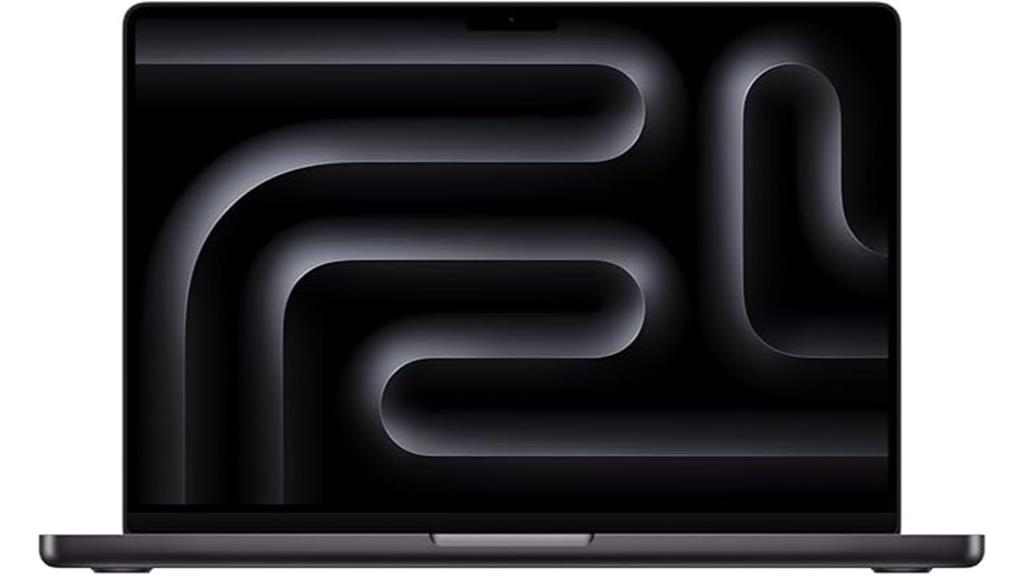
If you’re a data engineer seeking powerful performance and seamless integration, the Apple 2024 MacBook Pro with the M4 chip is an excellent choice. With its 10-core CPU and GPU, you’ll experience exceptional speed for multitasking and running demanding applications. The 14.2-inch Liquid Retina XDR display, boasting 1600 nits peak brightness and a stunning contrast ratio, ensures your visuals are always crisp and vibrant. Plus, with 16GB of unified memory and 512GB SSD storage, you’ll have ample space and speed for your projects. Enjoy all-day battery life and seamless integration with other Apple devices, enhancing your overall workflow.
Best For: Data engineers and professionals seeking powerful performance and seamless integration with Apple devices.
Pros:
- Exceptional speed for multitasking and running demanding applications thanks to the M4 chip’s 10-core CPU and GPU.
- Stunning visuals with the 14.2-inch Liquid Retina XDR display featuring 1600 nits peak brightness and a high contrast ratio.
- All-day battery life allows for consistent performance whether plugged in or on the go.
Cons:
- Higher price point compared to other laptops with similar specifications.
- Limited upgrade options for memory and storage post-purchase.
- May not be compatible with certain software not optimized for macOS.
Acer Swift X 14 Laptop (SFX14-72G-77NJ)
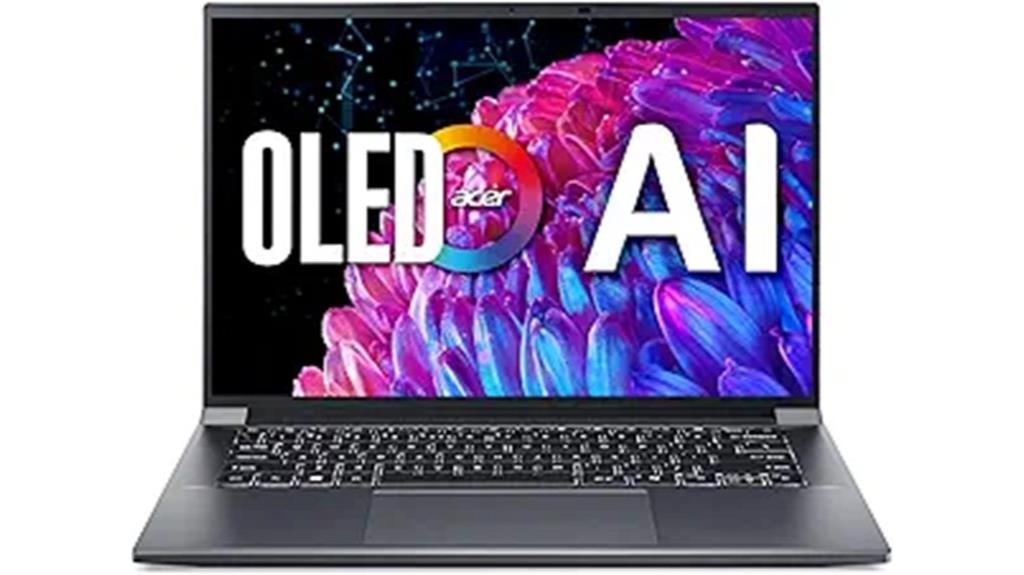
The Acer Swift X 14 Laptop (SFX14-72G-77NJ) stands out as an exceptional choice for data engineers seeking robust performance and efficiency in 2025. With its Intel Core Ultra 7 processor and NVIDIA GeForce RTX 4060 GPU, you’re equipped for demanding applications and seamless multitasking. The stunning 14.5-inch OLED display offers vibrant visuals, while the 1080p FHD webcam enhances your collaboration experience. Plus, with 16GB of LPDDR5X memory and a 1TB SSD, you’ll handle data like a pro. Connectivity options, including Killer Wi-Fi 6E, ensure you stay connected effortlessly as you tackle your data engineering projects.
Best For: The Acer Swift X 14 Laptop (SFX14-72G-77NJ) is best for data engineers and creators who require high-performance computing and exceptional display quality for intensive applications.
Pros:
- Exceptional processing power with Intel Core Ultra 7 and NVIDIA GeForce RTX 4060 for demanding applications.
- Stunning 14.5-inch OLED display with high resolution and refresh rate for vibrant visuals and reduced eye strain.
- Robust connectivity options, including Killer Wi-Fi 6E and Bluetooth 5.3, ensuring seamless internet access and device pairing.
Cons:
- Limited upgradeability due to its compact design, potentially restricting future enhancements.
- The premium features may come at a higher price point compared to basic laptops.
- Battery life may be shorter under heavy performance loads due to powerful hardware components.
Apple 2025 MacBook Air 15-inch Laptop with M4 chip
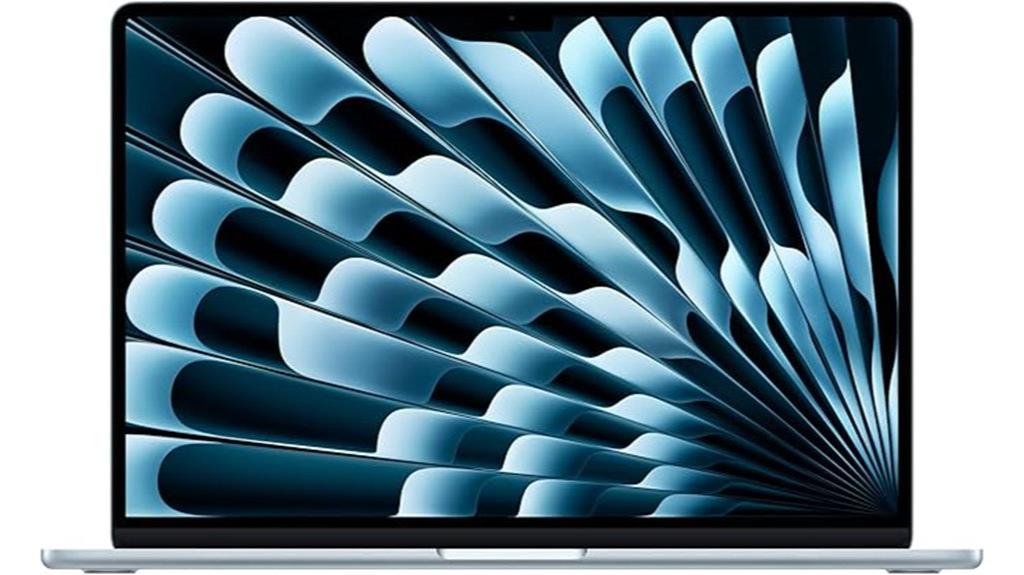
Engineered for efficiency, the Apple 2025 MacBook Air 15-inch with the M4 chip stands out as a top choice for data engineers who demand both performance and portability. With the M4 chip, you’ll enjoy remarkable speed for multitasking, video editing, and gaming, alongside an impressive 18-hour battery life. The 15.3-inch Liquid Retina display delivers stunning visuals, showcasing 1 billion colors in sharp detail. Plus, the 12MP Center Stage camera and immersive audio from six speakers enhance your video calls. With robust connectivity options like Thunderbolt 4 and Wi-Fi 6E, you’re set for seamless productivity in any environment.
Best For: The Apple 2025 MacBook Air 15-inch laptop is best for data engineers seeking high performance and portability in their computing devices.
Pros:
- Exceptional M4 chip performance enhances multitasking, video editing, and gaming capabilities.
- Stunning 15.3-inch Liquid Retina display with support for 1 billion colors for vibrant visuals.
- Long-lasting 18-hour battery life allows for extended use without frequent charging.
Cons:
- Limited upgradeability compared to traditional laptops with user-replaceable components.
- Higher price point may not be suitable for budget-conscious consumers.
- May lack certain specialized ports or features preferred by some professional users.
ASUS Vivobook S 14 OLED Slim Laptop (M5406WA-DS76)
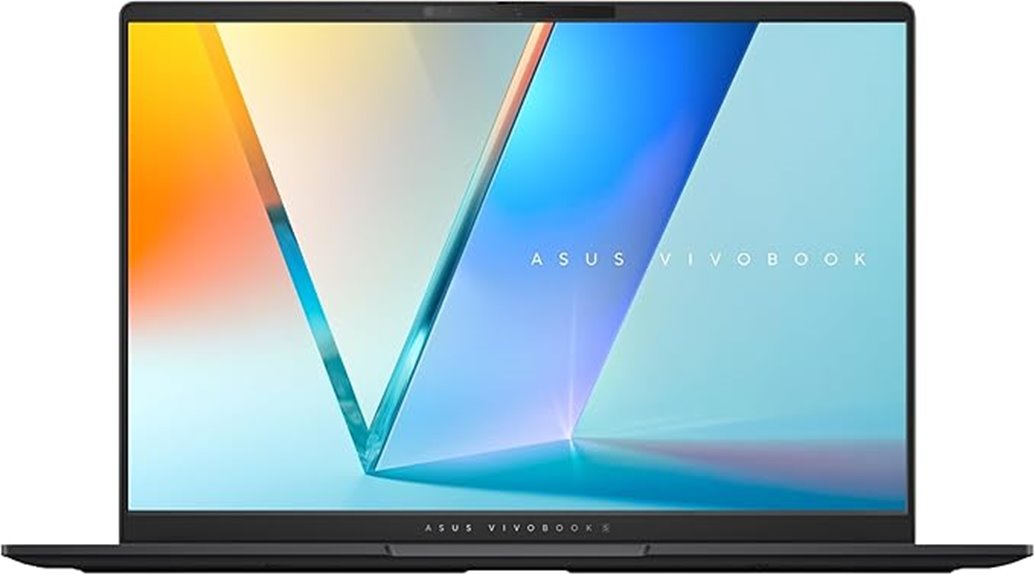
Data engineers looking for a powerful yet portable machine will find the ASUS Vivobook S 14 OLED Slim Laptop (M5406WA-DS76) an excellent choice. With its AMD Ryzen 9 365 processor and 24GB RAM, it handles demanding tasks with ease. The stunning 14” 3K OLED display offers vibrant colors and a 120Hz refresh rate, perfect for data visualization. Weighing just 2.87 lbs and measuring 0.63” thick, it’s easy to carry around. Plus, the customizable RGB backlit keyboard enhances your typing experience. With ample connectivity options, this laptop is designed to meet the needs of today’s data engineers effortlessly.
Best For: Data engineers seeking a powerful, portable laptop with exceptional display quality and performance.
Pros:
- High-performance AMD Ryzen 9 365 processor and 24GB RAM ensure smooth multitasking and handling of demanding applications.
- Stunning 14” 3K OLED display with 120Hz refresh rate provides vibrant colors and excellent clarity for data visualization.
- Lightweight and slim design makes it easy to transport, ideal for professionals on the move.
Cons:
- Limited storage capacity with only 512GB SSD, which may not be sufficient for large datasets.
- The single-zone RGB backlit keyboard may not cater to those who prefer more advanced customization options.
- Battery life could be a concern when using high-performance settings, especially with a bright display.
Samsung Galaxy Book4 Pro Business Laptop (NP944XGK-KG4US)
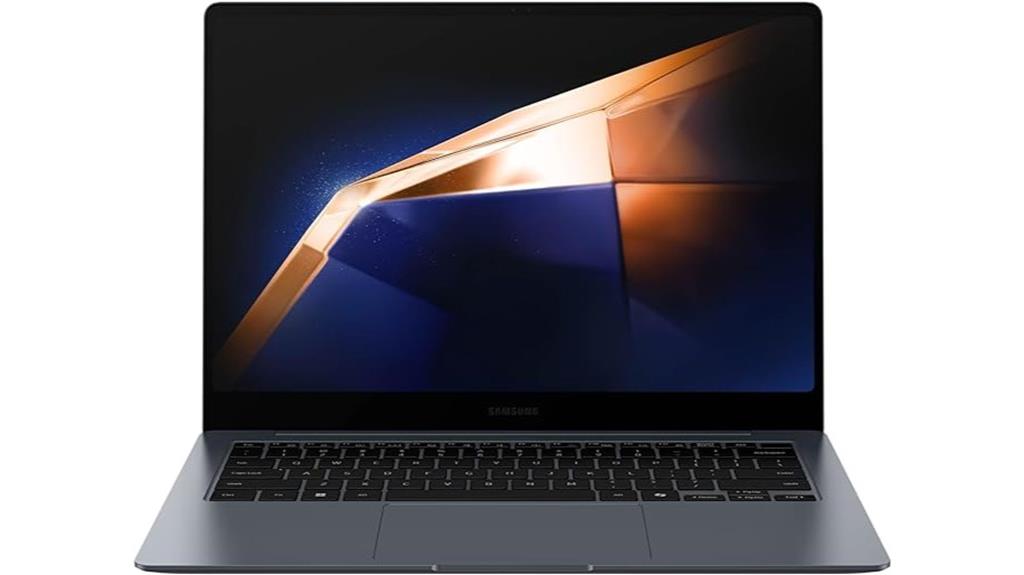
For data engineers who demand high performance on the go, the Samsung Galaxy Book4 Pro Business Laptop (NP944XGK-KG4US) stands out with its powerful Intel Core Ultra 7 processor and 32GB of RAM. Its 14-inch 3K AMOLED touchscreen delivers stunning visuals, perfect for multitasking and presentations. Weighing only 2.71 lbs, this sleek device is highly portable. With a 1TB SSD, it offers ample storage for your projects. Plus, the battery lasts up to 8 hours under maximum load, ensuring you stay productive. Integrated security features like Samsung Knox protect your data, making it an excellent choice for professionals.
Best For: Data engineers and professionals who require high performance and portability for multitasking and presentations.
Pros:
- Powerful Intel Core Ultra 7 processor and 32GB of RAM for high performance.
- Stunning 14-inch 3K AMOLED touchscreen for vibrant visuals.
- Lightweight design at 2.71 lbs, making it easy to carry on the go.
Cons:
- High retail price of $1749 compared to competitors with better specs.
- Limited RAM upgrade options in the US, Canada, and UK (max 16GB).
- OEM SSD from Western Digital may be perceived as low quality for the price.
ALSO READ: Best Laptops for Web Development, Best Laptops for Teletherapy, Best Laptops for Instructional Designers, Best Laptop for Outdoor Use, Best Laptop for Serato Dj, Best Laptops for Interior Designers, Best Laptop for Serato, Best Laptop for Forex Trading, Best Laptops for Telehealth, Best Laptop for Djs
Factors to Consider When Choosing the Best Laptop for Data Engineer
When you’re picking a laptop as a data engineer, you need to focus on key factors that impact your workflow. Performance and processing power, as well as display quality, are crucial for handling complex tasks. Don’t forget to consider battery life, connectivity options, and operating system compatibility to ensure a seamless experience.
Performance and Processing Power
Choosing the right laptop hinges on its performance and processing power, which are vital for a data engineer’s productivity. Look for laptops equipped with powerful multi-core processors, like Intel Core Ultra or AMD Ryzen, to efficiently handle parallel processing tasks. Dedicated GPUs, such as NVIDIA or AMD, can significantly accelerate data processing, particularly in machine learning and visualization. Ample RAM, ideally 16GB or more, is crucial for multitasking and running memory-intensive applications without slowdowns. Fast storage solutions, like SSDs with PCIe Gen 4 technology, reduce data loading times and enhance system responsiveness. Finally, opt for laptops with advanced connectivity options, including Thunderbolt ports, to facilitate high-speed data transfer and connection to external devices.
Display Quality and Resolution
Performance and processing power lay the groundwork for a data engineer’s workflow, but display quality and resolution play a significant role in how effectively you visualize and interact with data. Opt for a higher resolution display, like 3K or 4K, to enhance clarity when working with complex data sets. A high refresh rate of 120Hz or more ensures smoother transitions, which is essential for dynamic visualizations. Look for brightness levels of 600 nits or above to improve visibility in varying lighting conditions, reducing eye strain during long hours. Prioritize color accuracy through DCI-P3 coverage for true-to-life visuals. Finally, an aspect ratio of 16:10 or wider provides additional vertical space, enhancing productivity when viewing data tables and code side by side.
Battery Life and Efficiency
Battery life and efficiency are crucial for data engineers who need to stay productive during long hours of data processing. A laptop with up to 18 hours of battery life allows you to work uninterrupted, especially during data-intensive tasks or while remote without power access. Efficient battery performance is vital since complex algorithms and simulations can quickly drain power. Look for laptops with power-efficient processors that can handle demanding workloads without sacrificing battery life. Features like fast charging can reduce downtime, letting you recharge during short breaks. Additionally, consider display technology; OLED screens typically consume less power with darker images, enhancing overall battery longevity. Prioritizing these factors ensures you remain effective and focused on your work.
Connectivity and Port Options
How can you maximize your productivity as a data engineer? Start by choosing a laptop with a variety of connectivity options. Look for multiple USB ports, including both USB Type-C and USB-A, to easily connect your peripherals. Thunderbolt ports are essential for high-speed data transfers and linking to external displays. An HDMI port can make it simple to connect to projectors or monitors, enhancing collaboration during presentations. Consider a microSD card reader if you frequently transfer large datasets from cameras. Finally, ensure your laptop supports Wi-Fi 6E or better for faster wireless connections, which is crucial for network-intensive tasks and cloud applications. These features will ensure you stay connected and efficient in your data engineering work.
Operating System Compatibility
When selecting a laptop for data engineering, it’s crucial to consider operating system compatibility, as your choice can significantly impact your workflow. You’ll want a laptop that supports both Windows and macOS for flexibility, but don’t overlook Linux. Many data processing frameworks, like Apache Hadoop and Spark, thrive in Linux environments. Ensure your laptop can run tools like Jupyter Notebooks and Python libraries smoothly, as they’re essential for your work. Also, think about virtual machine or container support, such as Docker, since these tools require specific OS features. Finally, evaluate the operating system’s update frequency and security features; they play a vital role in maintaining data integrity and overall system performance. Choose wisely!
Frequently Asked Questions
What Is the Ideal RAM Size for Data Engineering Tasks?
For data engineering tasks, you’ll want at least 16GB of RAM, but 32GB is ideal for handling larger datasets and multitasking efficiently. This ensures smooth performance and reduces bottlenecks during complex computations and analyses.
How Important Is Battery Life for Data Engineers?
Battery life’s crucial for data engineers. You often work on the go, so a reliable battery keeps you productive during meetings or while traveling. It’s essential to balance performance with sufficient battery life for uninterrupted work.
Can I Use a Gaming Laptop for Data Engineering Work?
Yes, you can use a gaming laptop for data engineering work. They often have powerful processors and GPUs, which can handle data-intensive tasks, but consider battery life and portability based on your specific needs.
What Software Should I Install for Data Engineering?
For data engineering, you should install Python, Apache Spark, and SQL tools. Additionally, consider using Jupyter Notebooks for interactive coding, and Docker for containerization. These tools will enhance your efficiency and streamline your workflow significantly.
Are Refurbished Laptops Suitable for Data Engineering?
Yes, refurbished laptops can be suitable for data engineering, provided they meet your performance requirements. Just ensure they have adequate processing power, memory, and storage. You’ll save money while still getting reliable performance for your projects.
My Final Opinion
In conclusion, choosing the right laptop as a data engineer can greatly enhance your productivity and efficiency. The options we’ve explored, from the powerful MacBook Pro to the versatile Acer Swift X, cater to various needs and preferences. Consider factors like performance, battery life, and portability when making your decision. With the right device in hand, you’ll be well-equipped to tackle any data challenge that comes your way in 2025 and beyond.